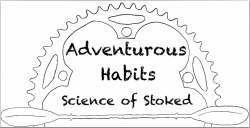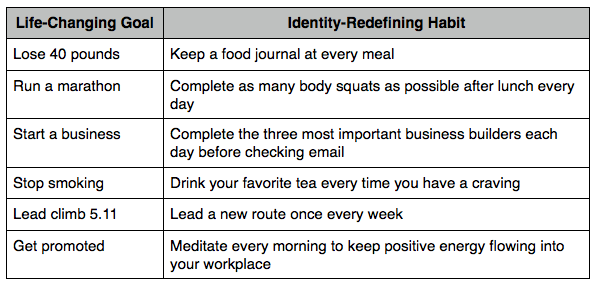So last week we ended with a question: how do habits work? There are three steps, Charles Duhigg explains in his book The Power of Habit. The cue (the reminder to begin the habit), the Routine (the habit itself), and the Reward.
Perhaps you brush your teeth every morning and evening. The cue for you is waking up and going to bed - two things you do every day. The habit is actually going to brush your teeth, and the reward is that your mouth feels so fresh and clean afterwards. Perhaps you were not good at brushing your teeth as a child - the reward of having a clean mouth wasn’t good enough. Now, though, you have a significant other that won’t kiss you until your mouth is clean. The reminder? Wanting to kiss your significant other. The routine is of course brushing your teeth, and the reward is a kiss. Wow!
Let’s glean an important note from that example - some rewards are not motivating enough to embed the habit. If you find yourself not completing a habit, make sure to change your reward to something that is more motivating! For example, I got off track on my meditation habit for a looonggg time, insisting that it was because of travel or other concerns (excuses). Finally, I decided that the reward would be my morning tea (or coffee). I placed my Emwave2 on the counter in front of my kettle as a cue, and had to meditate before making my beloved tea. That reward was highly motivating for me, and I finally engrained the meditation habit, which is certainly my keystone habit (discussed below).
The Science of Small Wins
So we are not wired for long-term rewards... then why would anyone make a goal of losing 40 pounds, running a marathon, adding 25 pounds to your bench press, starting a business, stopping smoking, traditional lead climbing 5.11, or getting promoted? Those rewards are too far in the future! Sure, some people are able to succeed with those goals, but what you will find is that they are able to create habits that allow them to achieve those goals. Life-changing accomplishments are great, but identity-redefining habits are how you ensure you get there.
Perhaps you brush your teeth every morning and evening. The cue for you is waking up and going to bed - two things you do every day. The habit is actually going to brush your teeth, and the reward is that your mouth feels so fresh and clean afterwards. Perhaps you were not good at brushing your teeth as a child - the reward of having a clean mouth wasn’t good enough. Now, though, you have a significant other that won’t kiss you until your mouth is clean. The reminder? Wanting to kiss your significant other. The routine is of course brushing your teeth, and the reward is a kiss. Wow!
Let’s glean an important note from that example - some rewards are not motivating enough to embed the habit. If you find yourself not completing a habit, make sure to change your reward to something that is more motivating! For example, I got off track on my meditation habit for a looonggg time, insisting that it was because of travel or other concerns (excuses). Finally, I decided that the reward would be my morning tea (or coffee). I placed my Emwave2 on the counter in front of my kettle as a cue, and had to meditate before making my beloved tea. That reward was highly motivating for me, and I finally engrained the meditation habit, which is certainly my keystone habit (discussed below).
The Science of Small Wins
So we are not wired for long-term rewards... then why would anyone make a goal of losing 40 pounds, running a marathon, adding 25 pounds to your bench press, starting a business, stopping smoking, traditional lead climbing 5.11, or getting promoted? Those rewards are too far in the future! Sure, some people are able to succeed with those goals, but what you will find is that they are able to create habits that allow them to achieve those goals. Life-changing accomplishments are great, but identity-redefining habits are how you ensure you get there.
There is something else you should know about habits: they are addictive. They are more addictive than drugs. Duhigg notes that years after former smokers have given up smoking, they may still crave a cigarette. How!? The chemical involved in the addiction has not been through their body in years! It is not actually the chemical they crave, but the habit. This means it is almost impossible to just ‘give up’ a habit. What is possible, instead, is creating new habits (easier) or replacing bad habits with good habits (more challenging).
I used to eat breakfast - it’s the most important meal of the day, right!? When I decided to change my life around after football, I tried to make big change after big change, and all of them were successful for a couple weeks before I went crashing back to my old habits. Ultimately, I made small changes to my habits, one at a time - starting with breakfast.
Originally, I used breakfast - which I already did every single day - as my cue. Every morning when I got up, I wanted breakfast. That reminded me that I was not going to have breakfast - instead I would have coffee. When first starting out, I used ‘Bulletproof Coffee’ as part of the ‘Bulletproof Fasting’ protocol. By replacing the breakfast habit with coffee, I was able to remind myself every morning using a habit that I already had, yet still get the reward my body was craving by drinking coffee instead. This kicked off my intermittent fasting habit.
Ultimately, I used the same process to convert my coffee habit into a yerba mate habit. I then used my yerba mate habit to kick off a writing habit - every time I enjoyed my morning mate, I wrote pages in this book. No matter how many pages or half-pages I completed, I danced by myself in celebration after writing. Clothes were usually not involved.
What you can see is that there are several important steps to new habit formation or habit replacement - I’ll lay them out for you here:
#1. Focus on one small shift at a time. It is easy to set lofty goals, but effective to make small changes.
#2. “Stop thinking of a new habit as something you have to do, but as something you are allowed to do.” -Leo Babauta
This is easy for fun stuff like drinking tea. For some, it may be harder for taking a cold shower or working out. You must find the good in it and create this mindset shift. How awesome is it that you have cold water available to you, which makes you feel like a superhero afterwards? How amazing is it that you get to take a break from work and play with the most fundamental of human pleasures, moving and interacting physically with the world?
#3. Create a cue based around a current habit or just things that happen everyday.
What do you do every single day? Wake up, brush your teeth, eat a dinosaur, leave a room, put your clothes on (hopefully), look at yourself in the mirror, talk to a friend, hear music, say the word ‘bro’?
Try to create a list of these things - any of them can serve as a cue for a new habit that you are going to form. If you are looking to do a habit replacement, then obviously the former habit is going to be the cue.
#4. "Make it so easy you can’t say no.” -Leo Babauta
Please don’t try to make a new habit of writing and require that you write at least 6 pages every morning. It just won’t work. Instead, make your habit so easy to start that you just can’t say no to doing it. Write one sentence every morning after tea. Meditate for ninety seconds after waking up. Do five body squats after every hour of working. Often, you will feel inspired to just go ahead and do more once you get started, and on the days that you aren’t inspired, you still stuck to your habit. Good job!
#5. Celebrate
This is the reward part of the cycle. Always reward yourself, no matter how small the success. With morning tea, the tea itself is enough of a reward. With writing or working out, do something that makes you happy, whether it is telling yourself “you are one baaaaaad Brave Monkey,” eating chocolate, dancing, or playing with puppies and sparkles. Remember, if you find yourself not completing the habit, the reward might not be motivating enough - try to change it so it is motivating.
Keystone Habits
Just as the keystone in an arch supports the weight of the rest of the arch and will cause the entire structure to collapse if removed, keystone habits serve to keep the rest of your habits, and life, in balance.
For many people, exercise is a keystone habit that influences other aspects of their life. When they exercise, they may also get to sleep earlier, resist poor food choices more easily, be more productive, and reduce stress more quickly. Did you know that people who exercise more, use their credit card less?
For me, meditation and intermittent fasting are keystone habits - it seems that even when I am traveling and away from my usual routines, if I at least meditate and wait until mid-day to eat my first meal, I stay grounded, feeling well, and productive throughout the rest of my day, even if I don’t complete all of my usual habits.
So what I am saying is that keystone habits are extremely powerful - they are essentially a method for strengthening your sense of willpower and self. The way to find keystone habits is to:
1. Look for practices that speak to your culture and values (your identity)
2. Look for practices that provide a platform for other changes
3. Look for practices that provide a sense of daily grounding or contentment
So what’s your keystone habit?
I used to eat breakfast - it’s the most important meal of the day, right!? When I decided to change my life around after football, I tried to make big change after big change, and all of them were successful for a couple weeks before I went crashing back to my old habits. Ultimately, I made small changes to my habits, one at a time - starting with breakfast.
Originally, I used breakfast - which I already did every single day - as my cue. Every morning when I got up, I wanted breakfast. That reminded me that I was not going to have breakfast - instead I would have coffee. When first starting out, I used ‘Bulletproof Coffee’ as part of the ‘Bulletproof Fasting’ protocol. By replacing the breakfast habit with coffee, I was able to remind myself every morning using a habit that I already had, yet still get the reward my body was craving by drinking coffee instead. This kicked off my intermittent fasting habit.
Ultimately, I used the same process to convert my coffee habit into a yerba mate habit. I then used my yerba mate habit to kick off a writing habit - every time I enjoyed my morning mate, I wrote pages in this book. No matter how many pages or half-pages I completed, I danced by myself in celebration after writing. Clothes were usually not involved.
What you can see is that there are several important steps to new habit formation or habit replacement - I’ll lay them out for you here:
#1. Focus on one small shift at a time. It is easy to set lofty goals, but effective to make small changes.
#2. “Stop thinking of a new habit as something you have to do, but as something you are allowed to do.” -Leo Babauta
This is easy for fun stuff like drinking tea. For some, it may be harder for taking a cold shower or working out. You must find the good in it and create this mindset shift. How awesome is it that you have cold water available to you, which makes you feel like a superhero afterwards? How amazing is it that you get to take a break from work and play with the most fundamental of human pleasures, moving and interacting physically with the world?
#3. Create a cue based around a current habit or just things that happen everyday.
What do you do every single day? Wake up, brush your teeth, eat a dinosaur, leave a room, put your clothes on (hopefully), look at yourself in the mirror, talk to a friend, hear music, say the word ‘bro’?
Try to create a list of these things - any of them can serve as a cue for a new habit that you are going to form. If you are looking to do a habit replacement, then obviously the former habit is going to be the cue.
#4. "Make it so easy you can’t say no.” -Leo Babauta
Please don’t try to make a new habit of writing and require that you write at least 6 pages every morning. It just won’t work. Instead, make your habit so easy to start that you just can’t say no to doing it. Write one sentence every morning after tea. Meditate for ninety seconds after waking up. Do five body squats after every hour of working. Often, you will feel inspired to just go ahead and do more once you get started, and on the days that you aren’t inspired, you still stuck to your habit. Good job!
#5. Celebrate
This is the reward part of the cycle. Always reward yourself, no matter how small the success. With morning tea, the tea itself is enough of a reward. With writing or working out, do something that makes you happy, whether it is telling yourself “you are one baaaaaad Brave Monkey,” eating chocolate, dancing, or playing with puppies and sparkles. Remember, if you find yourself not completing the habit, the reward might not be motivating enough - try to change it so it is motivating.
Keystone Habits
Just as the keystone in an arch supports the weight of the rest of the arch and will cause the entire structure to collapse if removed, keystone habits serve to keep the rest of your habits, and life, in balance.
For many people, exercise is a keystone habit that influences other aspects of their life. When they exercise, they may also get to sleep earlier, resist poor food choices more easily, be more productive, and reduce stress more quickly. Did you know that people who exercise more, use their credit card less?
For me, meditation and intermittent fasting are keystone habits - it seems that even when I am traveling and away from my usual routines, if I at least meditate and wait until mid-day to eat my first meal, I stay grounded, feeling well, and productive throughout the rest of my day, even if I don’t complete all of my usual habits.
So what I am saying is that keystone habits are extremely powerful - they are essentially a method for strengthening your sense of willpower and self. The way to find keystone habits is to:
1. Look for practices that speak to your culture and values (your identity)
2. Look for practices that provide a platform for other changes
3. Look for practices that provide a sense of daily grounding or contentment
So what’s your keystone habit?



